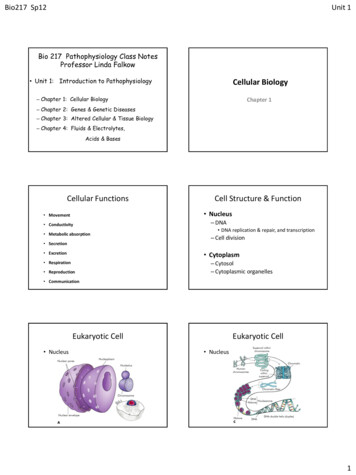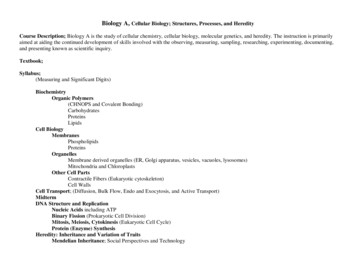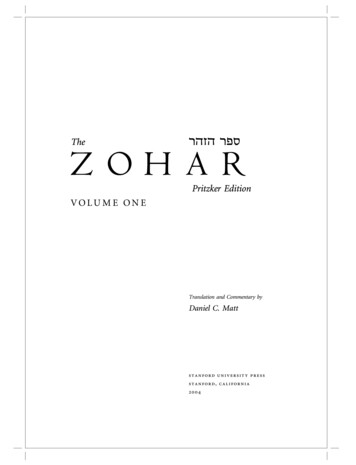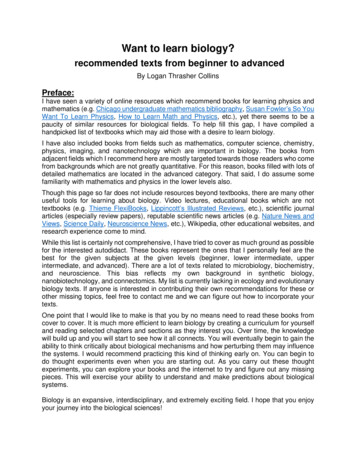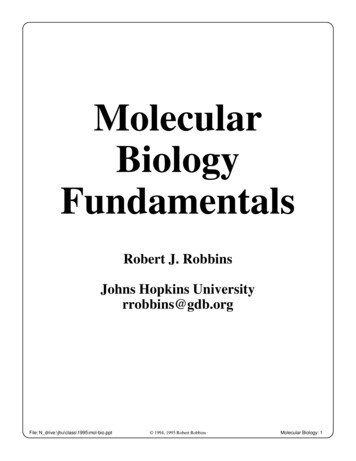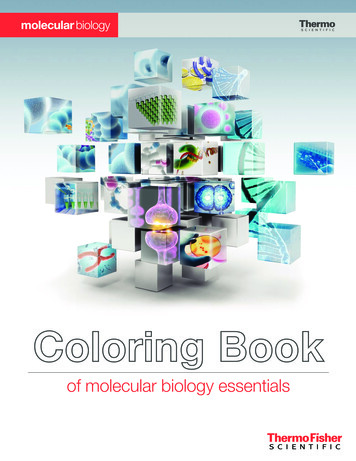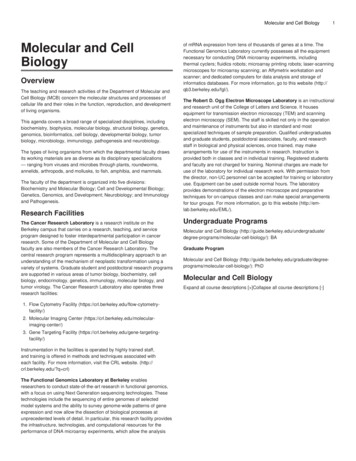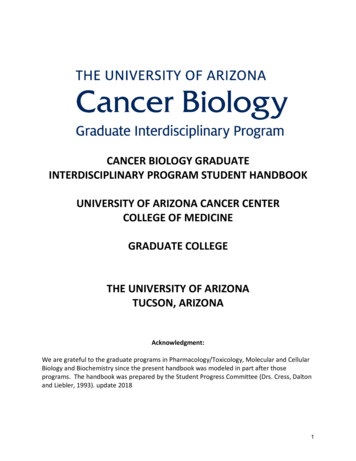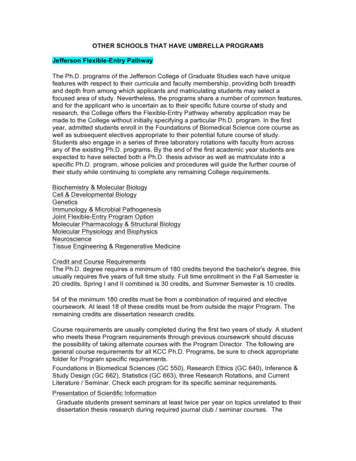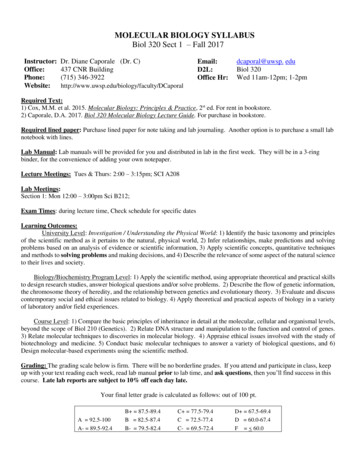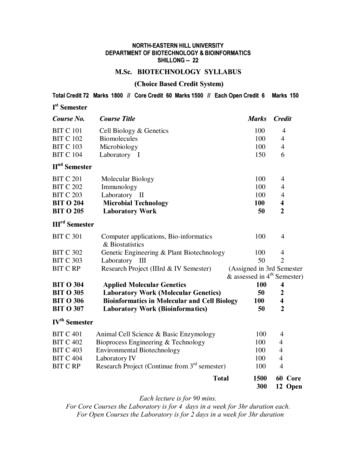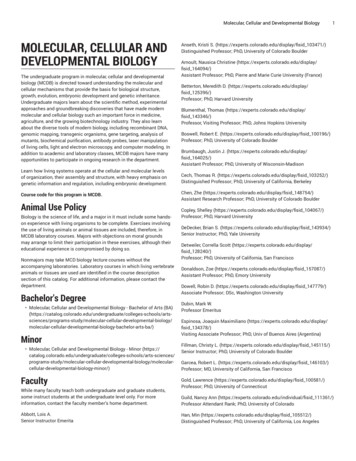
Transcription
Molecular, Cellular and Developmental BiologyMOLECULAR, CELLULAR ANDDEVELOPMENTAL BIOLOGYThe undergraduate program in molecular, cellular and developmentalbiology (MCDB) is directed toward understanding the molecular andcellular mechanisms that provide the basis for biological structure,growth, evolution, embryonic development and genetic inheritance.Undergraduate majors learn about the scientific method, experimentalapproaches and groundbreaking discoveries that have made modernmolecular and cellular biology such an important force in medicine,agriculture, and the growing biotechnology industry. They also learnabout the diverse tools of modern biology, including recombinant DNA,genomic mapping, transgenic organisms, gene targeting, analysis ofmutants, biochemical purification, antibody probes, laser manipulationof living cells, light and electron microscopy, and computer modeling. Inaddition to academic and laboratory classes, MCDB majors have manyopportunities to participate in ongoing research in the department.Anseth, Kristi S. (https://experts.colorado.edu/display/fisid 103471/)Distinguished Professor; PhD, University of Colorado BoulderArnoult, Nausica Christine (https://experts.colorado.edu/display/fisid 164094/)Assistant Professor; PhD, Pierre and Marie Curie University (France)Betterton, Meredith D. (https://experts.colorado.edu/display/fisid 125396/)Professor; PhD, Harvard UniversityBlumenthal, Thomas (https://experts.colorado.edu/display/fisid 143346/)Professor, Visiting Professor; PhD, Johns Hopkins UniversityBoswell, Robert E. (https://experts.colorado.edu/display/fisid 100196/)Professor; PhD, University of Colorado BoulderBrumbaugh, Justin J. (https://experts.colorado.edu/display/fisid 164025/)Assistant Professor; PhD, University of Wisconsin-MadisonLearn how living systems operate at the cellular and molecular levelsof organization, their assembly and structure, with heavy emphasis ongenetic information and regulation, including embryonic development.Cech, Thomas R. (https://experts.colorado.edu/display/fisid 103252/)Distinguished Professor; PhD, University of California, BerkeleyCourse code for this program is MCDB.Chen, Zhe (https://experts.colorado.edu/display/fisid 148754/)Assistant Research Professor; PhD, University of Colorado BoulderAnimal Use PolicyBiology is the science of life, and a major in it must include some handson experience with living organisms to be complete. Exercises involvingthe use of living animals or animal tissues are included, therefore, inMCDB laboratory courses. Majors with objections on moral groundsmay arrange to limit their participation in these exercises, although theireducational experience is compromised by doing so.Nonmajors may take MCD biology lecture courses without theaccompanying laboratories. Laboratory courses in which living vertebrateanimals or tissues are used are identified in the course descriptionsection of this catalog. For additional information, please contact thedepartment.Bachelor's Degree Molecular, Cellular and Developmental Biology - Bachelor of Arts ar-developmental-biology-bachelor-arts-ba/)Minor Molecular, Cellular and Developmental Biology - Minor evelopmental-biology-minor/)FacultyWhile many faculty teach both undergraduate and graduate students,some instruct students at the undergraduate level only. For moreinformation, contact the faculty member's home department.Abbott, Lois A.Senior Instructor Emerita1Copley, Shelley (https://experts.colorado.edu/display/fisid 104067/)Professor; PhD, Harvard UniversityDeDecker, Brian S. (https://experts.colorado.edu/display/fisid 143934/)Senior Instructor; PhD, Yale UniversityDetweiler, Corrella Scott (https://experts.colorado.edu/display/fisid 128240/)Professor; PhD, University of California, San FranciscoDonaldson, Zoe (https://experts.colorado.edu/display/fisid 157087/)Assistant Professor; PhD, Emory UniversityDowell, Robin D. (https://experts.colorado.edu/display/fisid 147779/)Associate Professor; DSc, Washington UniversityDubin, Mark W.Professor EmeritusEspinosa, Joaquin Maximiliano (https://experts.colorado.edu/display/fisid 134378/)Visiting Associate Professor; PhD, Univ of Buenos Aires (Argentina)Fillman, Christy L. (https://experts.colorado.edu/display/fisid 145115/)Senior Instructor; PhD, University of Colorado BoulderGarcea, Robert L. (https://experts.colorado.edu/display/fisid 146103/)Professor; MD, University of California, San FranciscoGold, Lawrence (https://experts.colorado.edu/display/fisid 100581/)Professor; PhD, University of ConnecticutGuild, Nancy Ann (https://experts.colorado.edu/individual/fisid 111361/)Professor Attendant Rank; PhD, University of ColoradoHan, Min (https://experts.colorado.edu/display/fisid 105512/)Distinguished Professor; PhD, University of California, Los Angeles
2Molecular, Cellular and Developmental BiologyHarvey, Pamela Ann (https://experts.colorado.edu/display/fisid 148012/)Senior Instructor; PhD, Tufts UniversityPark, Soyeon (https://experts.colorado.edu/display/fisid 151944/)Assistant Professor; PhD, Mayo Graduate School of MedicineHoenger, Andreas (https://experts.colorado.edu/display/fisid 142883/)Professor; PhD, Universität Basel (Switzerland)Parker, Roy Robert (https://experts.colorado.edu/display/fisid 151440/)Distinguished Professor; PhD, University of California, San FranciscoJones, Kevin Robert (https://experts.colorado.edu/display/fisid 102094/)Associate Professor; PhD, University of California, BerkeleyPerkins, Thomas T. (https://experts.colorado.edu/display/fisid 124578/)Professor Adjoint; PhD, Stanford UniversityJunge, Harald Jobst (https://experts.colorado.edu/display/fisid 148593/)Assistant Professor; PhD, Philipps-Universität Marburg (Germany)Runner, MeredithProfessor EmeritusKlymkowsky, Michael W. (https://experts.colorado.edu/display/fisid 101226/)Professor; PhD, California Institute of TechnologySawyer, Sara Lea (https://experts.colorado.edu/display/fisid 155218/)Professor; PhD, Cornell UniversityKnight, Jennifer Kirsten (https://experts.colorado.edu/display/fisid 101933/)Associate Professor; PhD, University of Michigan Ann ArborKralj, Joel M. (https://experts.colorado.edu/display/fisid 153055/)Assistant Professor; PhD, Boston UniversityKrauter, Kenneth S. (https://experts.colorado.edu/display/fisid 107978/)Professor, Associate Chair; PhD, Yeshiva UniversityKuempel, Peter L.Professor EmeritusShen, Jingshi (https://experts.colorado.edu/display/fisid 146414/)Professor; PhD, Columbia UniversitySingh, Ravinder (https://experts.colorado.edu/display/fisid 112067/)Associate Professor; PhD, Baylor College of MedicineStaehelin, L. AndrewProfessor EmeritusStowell, Michael (https://experts.colorado.edu/display/fisid 124136/)Associate Professor; PhD, California Institute of TechnologySu, Tin Tin (https://experts.colorado.edu/display/fisid 113847/)Professor, Chair; PhD, Carnegie Mellon UniversityLeinwand, Leslie Anne (https://experts.colorado.edu/display/fisid 107104/)Distinguished Professor, Faculty Director; PhD, Yale UniversitySueoka, NoboruProfessor EmeritusMartin, Jennifer Mary (https://experts.colorado.edu/display/fisid 110125/)Senior Instructor; PhD, University of WashingtonVan Blerkom, Jonathan (https://experts.colorado.edu/display/fisid 100545/)Research Professor; PhD, University of Colorado BoulderMastronarde, David N.Professor Attendant Rank; PhD, University of ColoradoVigers, Alison Jane (https://experts.colorado.edu/display/fisid 142378/)Instructor; PhD, University of Colorado DenverMcConkey, Edwin H.Professor EmeritusVoeltz, Gia Kaarina (https://experts.colorado.edu/display/fisid 143587/)Professor; PhD, Yale UniversityMcIntosh, J. RichardDistinguished Professor EmeritusWeaver, BenjaminAssistant Professor; PhD, University of KansasNiswander, Lee (https://experts.colorado.edu/display/fisid 160024/)Chair, Professor; PhD, Case Western Reserve UniversityWood, William B. IIIDistinguished Professor EmeritusOdorizzi, Charles Gregory (https://experts.colorado.edu/display/fisid 118429/)Professor; PhD, University of California, San DiegoXue, Ding (https://experts.colorado.edu/display/fisid 112336/)Professor; PhD, Columbia UniversityOld, William (https://experts.colorado.edu/display/fisid 103039/)Assistant Professor; PhD, University of Colorado BoulderOlwin, Bradley Bruce (https://experts.colorado.edu/display/fisid 109888/)Professor, Associate Chair; PhD, University of WashingtonOrth, James D. (https://experts.colorado.edu/display/fisid 152017/)Assistant Research Professor, Instructor; PhD, Mayo Graduate School ofMedicinePace, Norman R.Distinguished Professor EmeritusYarus, Michael J.Professor Emeritus
Molecular, Cellular and Developmental BiologyCoursesMCDB 1020 (1) Introduction to Molecular, Cellular and DevelopmentalBiology MajorIntroduces students to the Molecular and Cellular Biology major. Providesan overview of the major and how it differs from other CU biologyprograms; how to get involved in clubs, research, and/or internshipopportunities; strategies for succeeding in MCDB courses; and careeroptions. This is a first-year colloquium course specifically designed forfreshman and other students exploring their educational and careeropportunities in our department.Recommended: New MCDB majors.MCDB 1030 (3) Introduction to Molecular BiologyIntroduces the foundation of molecular, cell, developmental andevolutionary biology in the context of human development and disease.Including how the immune system works to protect us from infectionsand technologies being developed towards the goal of better healtharound the world. For nonmajors.Additional Information: GT Pathways: GT-SC2 -Natural Physicl Sci:LecCrse w/o Req LabArts Sci Core Curr: Natural Science SequenceArts Sci Gen Ed: Distribution-Natural SciencesMAPS Course: Natural ScienceMCDB 1041 (3) Fundamentals of Human GeneticsCovers the basic principles of genetics, human pedigree analysis,and how genetic diseases affect DNA, RNA, and proteins. Considersimplications of this research for medicine and society. For nonmajors.Recommended: Requisite good background in high school chemistry andbiology.Additional Information: GT Pathways: GT-SC2 -Natural Physicl Sci:LecCrse w/o Req LabArts Sci Core Curr: Natural Science SequenceArts Sci Gen Ed: Distribution-Natural SciencesMAPS Course: Natural ScienceMCDB 1043 (1) Exploring Genetics LaboratoryProvides hands-on experience with fundamental genetic principles.Topics include scientific method, experimental design, mitosis, meiosis,classical genetics, molecular genetics, mutagenesis, DNA analysis, andtransgenic organisms. Wherever possible, the focus of the lab will be onintegrating science process skills with human-relevant experiments toencourage students to learn and apply science skills while seeing theapplication to humans.Requisites: Restricted to Biological Sciences (MCDB) non-majors only.Recommended: Corequisite MCDB 1041.Additional Information: Arts Sci Core Curr: Natural Science LabArts Sci Gen Ed: Distribution-Natural Sci LabArts Sci Gen Ed: Distribution-Natural SciencesMAPS Course: Natural Science Lab or Lab/LecMCDB 1111 (3) Core Concepts in Biology I: Evolutionary, Molecular andCell BiologyWeb-based, in-class discussion course covering the fundamentalproperties shaping living systems. Uses evolutionary (including social)and physical-chemical mechanisms to frame molecular, cellular andorganismic processes. Interpreting and answering questions scientificallyas well as quantitative reasoning skills are stressed. Fulfills the MCDBmajor's requirement for MCDB 1150.Equivalent - Duplicate Degree Credit Not Granted: MCDB 1150Additional Information: Arts Sci Core Curr: Natural Science SequenceArts Sci Gen Ed: Distribution-Natural SciencesMAPS Course: Natural ScienceMCDB 1150 (3) Introduction to Cellular and Molecular BiologyCovers biologically important macromolecules and biological processes,together with an introduction to cell structure, function, and physiology.Provides the foundation for advanced MCDB courses to majors, and arigorous overview of modern biology to non-majors.Equivalent - Duplicate Degree Credit Not Granted: MCDB 1111Recommended: Prerequisite high school chemistry and algebra, andrecommended corequisite of MCDB 1152.Additional Information: GT Pathways: GT-SC2 -Natural Physicl Sci:LecCrse w/o Req LabArts Sci Core Curr: Natural Science SequenceArts Sci Gen Ed: Distribution-Natural SciencesMAPS Course: Natural Science Lab or Lab/LecMCDB 1152 (1) Problem Solving Co-Seminar for Introduction toMolecular and Cellular BiologyUses problem solving and other interactive group work to aid studentlearning in a corequisite course, MCDB 1150. Students will work in smallgroups on learning and practicing how to solve difficult conceptualproblems, as well as using hands-on activities and concept mapping tohelp learn content.Recommended: Corequisite MCDB 1150.MCDB 1161 (2) From Dirt to DNA: Phage Genomics Laboratory IProvides laboratory experience working on a bacteriophage genomicsresearch project. Students will study novel bacteriophage they isolatefrom the environment. Topics covered include phage biology, bacteriaand phage culturing and amplification, DNA isolation, restriction digestanalysis, agarose gel electrophoresis, and electron microscopy.Recommended: Prerequisites or corequisites: MCDB 1150 or EBIO 1210.Grading Basis: Letter GradeAdditional Information: Arts Sci Core Curr: Natural Science LabArts Sci Gen Ed: Distribution-Natural Sci LabArts Sci Gen Ed: Distribution-Natural SciencesMAPS Course: Natural Science Lab or Lab/LecMCDB 1171 (2) Drug Discovery Through Hands-on Screens IProvides introductory research and laboratory experience. Students willwork in teams to screen small molecule libraries for novel antibioticsusing the bacterium Salmonella as a model system. Topics coveredinclude the basic biology of the model system, genetics, approachesto screening for new therapeutics, statistical analysis of the data,compound verification and lead compound development.Recommended: Prerequisite or corequisite MCBD 1150 or EBIO 1210.Grading Basis: Letter GradeAdditional Information: Arts Sci Core Curr: Natural Science LabArts Sci Gen Ed: Distribution-Natural Sci LabArts Sci Gen Ed: Distribution-Natural SciencesMAPS Course: Natural Science Lab or Lab/LecMCDB 1181 (2) Biological Probiotic/Drug Discovery Through Hands-onScreensProvides introduction to research and laboratory experience. Studentswill work in teams to screen novel mycobacterial strains for use asprobiotics or immunoregulatory/anti-inflammatory drugs using THP-1cells, a human monocytic cell line. Topics covered include the hygieneor "Old Friends" hypothesis, the human microbiome, approaches toscreening for new probiotics of therapeutics and statistical analysis ofthe data.Equivalent - Duplicate Degree Credit Not Granted: IPHY 1181Grading Basis: Letter Grade3
4Molecular, Cellular and Developmental BiologyMCDB 1234 (1-9) Skills Center: Modular Laboratory of Modern MolecularBiology SkillsDedicated to teaching students fundamental laboratory skills inmodern molecular biology. The skills are updated on a rolling basis inconsultation with MCDB faculty and local Pharma/Biotech companiesin an effort to provide students with real world skills that can helpthem transition from a traditional lab course environment to a moreindependent research environment. Students can mix and match variousskills to receive one or more university credit hours and students whosuccessfully complete a module are given a certificate recognizing theircompetency. Skills can be viewed at Repeatable: Repeatable for up to 15.00 total credit hours.Grading Basis: Letter GradeMCDB 2150 (3) Principles of GeneticsIntroduces the behavior of genes and chromosomes in eukaryotic andprokaryotic organisms. Covers three areas: transmission genetics,molecular genetics, and population genetics. Attention is given to geneticmapping, recombinant DNA procedures, and gene expression.Equivalent - Duplicate Degree Credit Not Granted: MCDB 2222Recommended: Prerequisite MCDB 1150 or EBIO 1210 or CHEN 2810(minimum grade C-) and recommended corequisite of MCDB 2152.Additional Information: GT Pathways: GT-SC2 -Natural Physicl Sci:LecCrse w/o Req LabArts Sci Core Curr: Natural Science SequenceArts Sci Gen Ed: Distribution-Natural SciencesMCDB 2152 (1) Problem Solving Co-Seminars for GeneticsUses problem solving and other interactive group work to aid studentlearning in MCDB 2150. Students will work in small groups on learningand practicing how to solve difficult conceptual problems, as well asusing hands-on activities and concept mapping to help learn content.Recommended: Corequisite MCDB 2150.MCDB 2161 (2) From DNA to Genes, Phage Genomics Laboratory IIProvides laboratory experience working on a bacteriophage isolatedduring the previous semester. Topics include bioinformatics, genomeannotation, open reading frame and RNA identification, BLAST analysis,phylogenetics and submission to a genomic database.Requisites: Requires prerequisite course of MCDB 1161 (minimum gradeC-).Additional Information: Arts Sci Gen Ed: Distribution-Natural SciencesMCDB 2171 (2) Drug Discovery Through Hands-On Screens 2Provides introductory research and laboratory experience. Students willwork in teams to screen molecule libraries using fruit flies as a modelsystem. Topics covered include the basic biology of the model system,genetics, approaches to screening for new therapeutics, statisticalanalysis of the data, compound verification and lead compounddevelopment.Recommended: Prerequisite or corequisite MCBD 1150 or EBIO 1210.Grading Basis: Letter GradeAdditional Information: Arts Sci Core Curr: Natural Science LabArts Sci Gen Ed: Distribution-Natural Sci LabArts Sci Gen Ed: Distribution-Natural SciencesMCDB 2200 (3) Introduction to Biophysical Methods: From Brains toBondsProvides a practical overview of modern biophysical methods used tostudy biological systems from whole body imaging methods to methodsfor investigating single molecules and molecular bonds. The goal of thiscourse is to provide a broad survey of methods available to the modernbiologist rather than a complete in-depth treatment of the physics andmathematics of each individual method.Requisites: Requires prerequisite course of MCDB 1150 or EBIO 1210(minimum grade C-).MCDB 2222 (3) Core Concepts in Biology II: Genes, Genetics andPhenotypesWeb-based, in-class discussion course focused on the origins of geneticvariation and inheritance, genome dynamics and gene expression andtheir relationship to phenotype(s). Interpreting, explaining and answeringquestions scientifically as well as quantitative reasoning are stress.Course fulfills the departmental requirement for MCDB 2150.Equivalent - Duplicate Degree Credit Not Granted: MCDB 2150Requisites: Requires a prerequisite course of MCDB 1111 or MCDB 1150(minimum grade C-).Grading Basis: Letter GradeAdditional Information: Arts Sci Core Curr: Natural Science SequenceArts Sci Gen Ed: Distribution-Natural SciencesMCDB 2350 (3) Understanding Cancer: Introduction to the disease¿sbiology, medicine, and societal implicationsA course for students who want to learn about cancer but have little orno background in biology. It is based on a text that presents relevantscience and medicine in a readable and comprehensible way. Classes willbe discussion of material from the text with weekly quizzes for feedback.The ethics and economics of cancer treatments will be discussed, alongwith ways to minimize one¿s own cancer risk and live with cancer ifnecessary.Additional Information: Arts Sci Gen Ed: Distribution-Natural SciencesMCDB 2840 (1-3) Lower-Division Independent StudyStudents with adequate prerequisites should take MCDB 4840.Repeatable: Repeatable for up to 8.00 total credit hours.MCDB 3000 (3) Synthetic Biology: Engineering Biomolecular Systems inthe LaboratoryHands-on research experience in engineering biological systems.Students will design biological systems to address relevant medicaland environmental problems facing our society. They will learn how tobuild their molecular designs in the lab using current synthetic biologytechniques. Students will also learn how to critically evaluate currentresearch in the field and effectively communicate their own research.Formerly offered as a special topics course.Repeatable: Repeatable for up to 6.00 total credit hours.Requisites: Requires prerequisite courses of (MCDB 1150 andMCDB 2150) or CHEN 2810 (all minimum grade C).Additional Information: Arts Sci Gen Ed: Distribution-Natural Sci Lab
Molecular, Cellular and Developmental BiologyMCDB 3010 (2) Undergraduate Teaching in Course-Based UndergraduateResearch ExperiencesTo address the need for more advanced and continued participationin course-based research, MCDB 3010 is designed to train studentswho have taken MCDB 1171 or MCDB 2171 or MCDB 4202 as teachingassistants. The aim is to enhance the students' experience andresponsibilities in course-based research and to prepare them forresearch and mentorship in a departmental or graduate laboratory.Repeatable: Repeatable for up to 4.00 total credit hours.Requisites: Requires prerequisite course of MCDB 1171 or MCDB 2171 orMCDB 1161 or MCDB 4202 (minimum grade B).Grading Basis: Letter GradeMCDB 3105 (3) Antibiotics: Functions and FailuresLearn about treatments for infectious diseases, how the first antibioticswere discovered, where they come from, how and why they work, and howresistance develops. Understand how antibiotics make modern medicinepossible. Explore ways clinicians minimize the spread of resistanceto antibiotics. Examine how new antibiotics and other approaches totreating infection are being developed.Requisites: Requires prerequisite course of MCDB 2150 (minimum gradeC).Grading Basis: Letter GradeMCDB 3135 (3) Molecular BiologyExamines the central dogma of biology by discussing the most importantmolecules in cells (DNA, RNA and protein) and how their synthesis (DNAreplication, transcription, RNA processing and translation) is regulated.Incorporated into the discussion is how recombinant DNA techniquesare used to discover and dissect cellular processes, how to design andinterpret experiments, and understanding the limits of experiments todraw conclusions.Requisites: Requires prerequisite courses of MCDB 2150 or EBIO 2070and CHEM 1113 or CHEM 1400 or CHEN 1211 (all minimum grade C-).Additional Information: Arts Sci Gen Ed: Distribution-Natural SciencesMCDB 3140 (2) Cell Biology LaboratoryProvides laboratory experience using microscopy, bioinformatics, DNAisolation, PCR and gel electrophoresis to study cell biology and geneexpression in a model organism. Students will learn research skills suchas interpreting data and planning experiments.Recommended: Corequisite MCDB 3135 or MCDB 3145.Additional Information: Arts Sci Gen Ed: Distribution-Natural Sci LabArts Sci Gen Ed: Distribution-Natural SciencesMCDB 3145 (3) Cell BiologyExamines intracellular mechanisms, including transport of ions and smallmolecules across membranes; protein targeting to organelles; membranetrafficking between organelles; signal transduction; the cytoskeleton; andthe cell cycle.Requisites: Requires prerequisite courses of (MCDB 2150 or EBIO 2070)and (CHEM 1113 or CHEM 1400 or CHEN 1211) (all minimum grade C-).Recommended: Prerequisite or corequisite MCDB 3140 concurrent witheither this class or MCDB 3135.Additional Information: Arts Sci Gen Ed: Distribution-Natural SciencesMCDB 3150 (3) Biology of the Cancer CellHighlights dimensions of the cancer problem; cancer as a genetic/cellulardisease; chemicals, viruses, and radiation as causes of cancer; cancerand diet; cancer epidemiology; cancer risk factors; proto-oncogenes,oncogenes, and cancer suppressor genes; and prevention of cancer.Recommended: Prerequisite MCDB 2150 or EBIO 2070 (minimum gradeC-).Additional Information: Arts Sci Core Curr: Natural Science Non-SequenceArts Sci Gen Ed: Distribution-Natural Sciences5MCDB 3160 (3) Infectious DiseaseIllustrate how cutting edge tools in genomics can be used to study,monitor and cure disease caused by new and re-emerging humanpathogens such as SARS/MERS, Ebola virus, Neisseria meningitides,influenza virus and malaria parasites. Technologies covered will includegenome sequencing, annotation, transcriptomics, phylogenetics andgenotyping of microbial populations. An integrated approach to thistopic will be presented, with these concepts threaded throughout: naturalhistory and evolution of pathogens, molecular biology, immunology,epidemiology, public health and clinical diagnosis. There may be someoverlap with material covered in MCDB 1030 and MCDB 4750.Requisites: Requires prerequisite course of MCDB 2150 or EBIO 2070(minimum grade C-).Additional Information: Arts Sci Gen Ed: Distribution-Natural SciencesMCDB 3171 (2) Advanced Discovery Based Lab - AntibioticsProvides students an opportunity to expand upon the research theyperformed in the introductory level course, Drug Discovery ThroughHands on Screens I (MCDB 1171). Students will work in teams to validatepotential antibiotics against human pathogens. Topics include hitvalidation, dose response, mechanism of action, applied statisticalanalysis, and an introduction to the primary literature.Repeatable: Repeatable for up to 4.00 total credit hours.Requisites: Requires prerequisite course of MCDB 1171 (minimum gradeC-).Grading Basis: Letter GradeMCDB 3300 (3) Personalized Medicine - Recent Advances in Diagnosticsand TherapeuticsTime for personalized medicine is now. Attempts to learn from andput the patient/person back into the equation because personalizedmedicine, at its worst, does nothing personal at all. Discusses historicalperspective, recent advances in molecular biology and medicine(including OMICS) in regards to diagnostics and therapeutics for selectedhuman diseases, and what the future holds for personalized medicine.Guest lectures (medical experts, patients, family members) will furtherenrich the course.Recommended: Prerequisites MCDB 2150 or EBIO 2070.Additional Information: Arts Sci Gen Ed: Distribution-Natural SciencesMCDB 3330 (3) Evolution and CreationismIntensive lecture/discussion course on the interrelationships amongscience, religion, and social policy. Includes historical and scientificdevelopment of evolution theory, social Darwinism/sociobiology, and thepublic perception of science.Recommended: Prerequisite MCDB 1150 or EBIO 1210 (minimum gradeC-).Additional Information: Arts Sci Core Curr: Natural Science Non-SequenceArts Sci Gen Ed: Distribution-Natural SciencesMCDB 3332 (1) Scientific EthicsA reading/discussion course on the implications of modern biologicallybased technologies, from in vitro fertilization and its variants and issuessurrounding these techniques, to genomic testing of embryos andadults, the genetic engineering of organisms, including humans, toissues surrounding communicable diseases and vaccination. Discussionwill include a serious consideration of various philosophical and nonscientific perspectives.Requisites: Requires prerequisite course of MCDB 1150 or EBIO 1210(minimum grade C). Restricted to students with 57-180 credits (Juniors orSeniors).Grading Basis: Letter GradeAdditional Information: Arts Sci Gen Ed: Distribution-Natural Sciences
6Molecular, Cellular and Developmental BiologyMCDB 3333 (3) Biomedical Innovations and DiscoveriesDiscusses how biological inventions and discoveries fuel biomedicalinnovations, how important techniques in molecular biology haveadvanced our understanding of cellular processes and contributedto biotechnology revolution and biomedical sciences to benefit oursociety. Guest lectures from experts in industry and site visits willenhance the course by providing a non-academic perspective, networkingopportunities, and unexpected avenues for career paths for ourgraduates. Department enforced prerequisite: MCDB 2150 or EBIO 2070or instructor consent.Additional Information: Arts Sci Gen Ed: Distribution-Natural SciencesMCDB 3350 (3) Fertility, Sterility, and Early Mammalian DevelopmentDescribes the production of germ cells, ovulation, fertilization,reproductive cycles, controls of reproduction, early development ofthe embryo, methods of contraception, and causes and treatmentsof sterility. Recommended for students planning careers in the healthsciences.Recommended: Prerequisite MCDB 1150 or EBIO 1210 (minimum gradeC-).Additional Information: Arts Sci Gen Ed: Distribution-Natural SciencesMCDB 3450 (3) Biological Data ScienceThe central function of data science is to extract information fromcomplex datasets. Biology is an increasingly large-data endeavor withhealth care records, genomics datasets, and extensive imaging. Thiscourse will develop core data science skills, including statistical analysis,visualization, data management, machine learning, and modeling.Recommended: Prerequisite MCDB 2150 or EBIO 2070 (minimum gradeC-), or exposure to probability theory.Additional Information: Arts Sci Gen Ed: Distribution-Natural SciencesMCDB 3501 (3) Structural Methods for Biological MacromoleculesTeaches fundamental knowledge about protein structures, proteininteractions and protein folding. Discusses in detail the most commonmethods on how proteins and macromolecular complexes are studied,such as X-ray crystallography, NMR-spectroscopy and electronmicroscopy. Offers about 50 percent direct teaching, 40 percentdiscussion of papers in a journal club style and 10 percent hands-onpracticals on software packages relevant to structural biology. FormerlyMCDB 4501.Recommended: Prerequisite MCDB 2150 or EBIO 2070 (minimum gradeC-).Additional Information: Arts Sci
The undergraduate program in molecular, cellular and developmental biology (MCDB) is directed toward understanding the molecular and cellular mechanisms that provide the basis for biological structure, growth, evolution, embryonic development and genetic inheritance. Undergraduate majors learn about the scientific method, experimental
